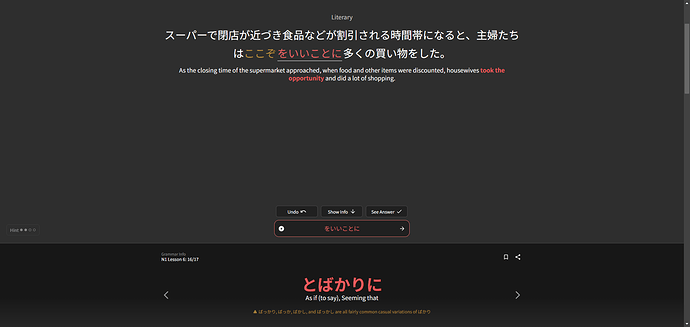I have to say, I don’t understand the words in the initial hints. So, if you are expecting people to be able to do it just from the hints and not needing the English sentences a little at first thats a difficult thing to ask. When you write (Archaic, Commanding) (Gentle, SUggestive) I have no idea what that means. It looks like gibberish to me.
So, having the English translations not really match and having the hints not really make sense to me makes this problem even more compounded. I have a degree in language acquistion and the idea of having people think in Japanese is a great one and the overall goal. But, its generally not … the initial aim when someone is a beginner. After someone has just been exposed to a grammar point they wont be able to do that. All youll achieve with generic translations and hints is frustration and demotivation.
When you are first learning something, most of the time, it needs to be directly related. Vagueness actually can cause mislearning of terms and if that fossilizes its hard to fix later. The AIM is to get to thinking in Japanese but for most learners that requires a lot of repetitive use of the grammar, word, etc in the beginning.
Your brain doesn’t simply move newly acquired items into your language center. (At least it doesn’t for most people). It would be difficult to do but it would be better to SCAFFOLD what you are trying to do. A system where the translations were more DIRECT until you hit a certain level would probably be better for getting to think in Japanese. First, you learn the grammar pattern, than you go through 10-15 repetitive but direct translation, than as they get used to it and that grammar starts to become part of their ACTIVE language you take away parts of the scaffolding and that is when people START to think in the target language. When people are getting closer to the “master” level of the SRS style it would than become very beneficial to be more vague and have them rely on the Japanese sentence and just a little later the ability to even have a translation being removed would be viable and probably beneficial.
But, for most learners, just expecting that ability right in the VERY BEGINNING is not pedalogically sound. Almost no one can read a grammar point and than just jump into doing what you are suggesting. If you are getting that feedback, that you are getting, with understanding that most people who feel frustrated will just stop using the program, its indicating exactly that.
Its a wonderful thing that you are aiming for people to be thinking in Japanese and not even looking at the English translation and I think that is something that people should be trying to do and should be worked up to. But, its simply not how language acquisition works. You could get people there by doing what is suggested above and thats generally how you would scaffold it for a student in a classroom in real life. You wouldn’t just go “Hey, we studied this grammar once and now im going to remove reliable translations because you should be thinking in the target language” because you haven’t scaffolded to that point. You would have the students use it for a little while in a constructed scaffolded way and than slowly pull out that scaffolding and in just a small while most of them would be able to complete those sentences without even seeing the English like you want them to.
It would probably be way too much work but that would have been my suggestion for you to do at the start. First 5-10 correct reviews have a closely translated sentence using the taught English equivalent. After 10 correct answers the sentences might be the same but be translated to show the spirit of the grammar. After 12-14 the translation would be gone completely.
That would accomplish what you want and be more accessible to the majority of students and likely produce better results. At the end of the day, if you’re system is pissing people off for the reasons stated by the posters above… most of them will either struggle through it without telling you or quit. The majority aren’t going to actually give you feedback. Its just how the majority of people are.
Its a common thing that if you haven’t studied how to teach a language even if you are proficient in both languages you hold bias that certain things that are easy for you are easy. Theres a reason that most countries require you to get a separate and specific masters degree if you want to be a language teacher to second language learners. (Japan ironically being an exception to this).
That being said, this feels like it could be a very good tool and I think it IS a very good tool despite having a few warts. I think you’ve made a good thing here. But, its also one I wouldn’t recommend to people if I didn’t think they had a lot of resolve to learn Japanese. For a person at the beginning of their journey or someone I know gets discouraged easily I would steer them towards a traditional classroom even though I think that the format may be more useful or a fantastic companion tool to a traditional classroom.
If your tool can make people even of high level frustrated and you have literal beginners saying theyre on the verge of quitting. Thats a real problem. (There are both of those things in this thread)





